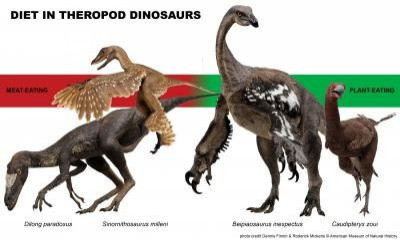Most Dinosaurs Were Veggie, Says Study

Most bird-like dinosaurs long believed to be carnivorous predators were eating plants, a new research showed.
Among the most bird-like dinosaurs - known as coelurosaurs - plant eating was a common way of life, the research by Lindsay Zanno and Peter Makovicky of Field Museum in Chicago found.
The scientists used statistical analyses to determine the diet of 90 species of theropod dinosaurs.
Their results challenge the conventional view that nearly all theropods hunted prey, especially those closest to the ancestors of birds.
Most theropods are clearly adapted to a predatory lifestyle, but somewhere on the line to birds, predatory dinosaurs went soft, said Zanno.
The scientists found almost two dozen anatomical features statistically linked to direct evidence of plant eating among coelurosaurian dinosaurs, such as the loss of teeth or a long neck.
Once we linked certain adaptations with direct evidence of diet, we looked to see which other theropod species had the same traits, Zanno said, then we could say who was likely a plant eater and who was not.
Forty-four theropod species distributed across six major lineages were eating plants and that the ancestor to most feathered dinosaurs and modern birds had probably already lost its appetite for flesh alone, the scientists said.
Because plant eating was found to be so widespread in Coelurosauria, the hypercarnivorous habits of T. rex and other meat eating coelurosaurs like Velociraptor should be viewed more as the exception than the rule, Zanno said.
This new research firmly supports what we've have been speculating about for some time, she said. Its time to start seeing these animals in a new evolutionary context.
The researcher's findings also suggest that iconic predators such as the Velociraptor of Jurassic Park fame and their close relatives may have evolved from omnivorous ancestors.
The study will be published in the journal Proceedings of the National Academy of Sciences.
© Copyright IBTimes 2025. All rights reserved.





















